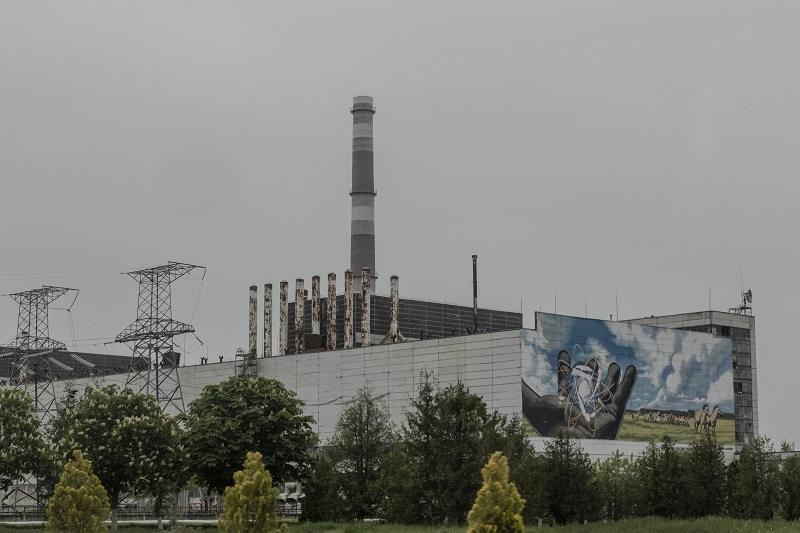
The Chernobyl nuclear power plant, which in 1986 was the site of the world’s worst nuclear disaster.
14:07 JST, June 3, 2022
CHERNOBYL, Ukraine – Six hundred ninety-eight computers. 344 vehicles. 1,500 radiation dosimeters. Irreplaceable software. Almost every piece of firefighting equipment.
The list of what Russia’s occupying forces stole, blew up or riddled with bullets in and around Chernobyl’s laboratories is still being compiled.
While the catastrophe that many feared has been avoided – war unleashing radiation across the region from the site of the world’s worst nuclear disaster in 1986 – officials at the Chernobyl plant are taking stock of Russia’s capricious and chaotic month here, in which nine of their colleagues were killed and five were kidnapped.
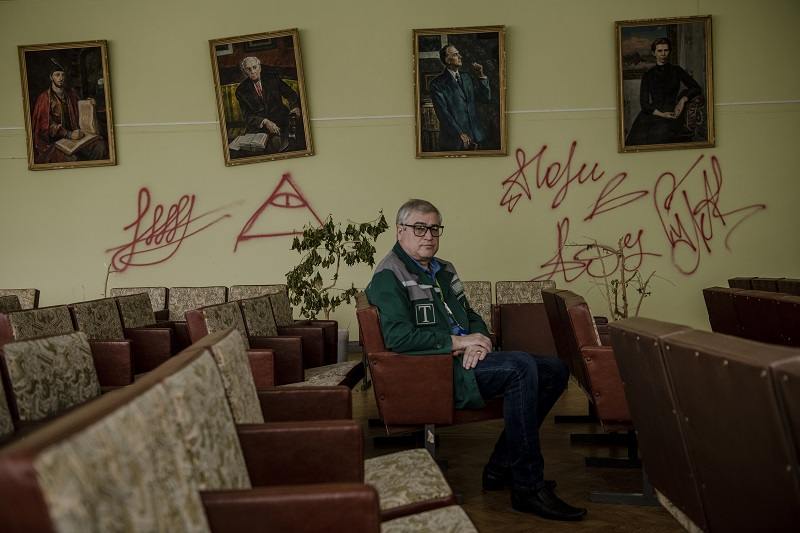
Mykola Bespaly, director of the Central Analytical Laboratory in Chernobyl.
“I cannot say that they have caused damage to mankind, but certainly great economic damage to Ukraine,” said Mykola Bespaly, 58, director of the site’s Central Analytical Laboratory, sitting in a lecture hall defaced by Russian graffiti.
The enormous nuclear station in Chernobyl no longer produces power, but before the invasion nearly 6,000 workers still monitored the lasting effects of the disastrous meltdown more than three decades ago, as well as processing spent nuclear fuel from other plants in Ukraine and Europe.
Located just a few miles from the Belarusian border, Chernobyl was one of the first places occupied by Russian troops. Yevhen Kramarenko, the director of the “exclusion zone” – a thousand-square-mile area where radiation levels remain high and public access is limited – said that on the first day of the invasion, a Russian general presented himself as the new leader of the station, and introduced employees from Rosatom, Russia’s state nuclear agency.
“I believe that at the time when they came,” Kramarenko said, “they planned to be there permanently, they planned to take control for a long time.”
In the days before the invasion, all but a few hundred employees were evacuated. Those who stayed worked shifts lasting hundreds of hours under Russian supervision, often not resting for days while trying to keep the station safe and systems running.
Meanwhile, the station’s equipment and information were being systematically stolen or destroyed, said Kramarenko. Now that he’s back in charge, he’s been checking on some of the stolen equipment that had been fitted with GPS trackers. Some are still transmitting location data.
“We see that part of it is located on the territory of Belarus, along the border. And part moves around the territory of Belarus – Gomel, Minsk, other places,” he said.
All in all, he estimates the cost of replacing what was lost at more than $135 million. The software, however, was custom-made for the station and is irreplaceable. Bespaly said some of his laboratory’s most important work – monitoring radiation levels across the exclusion zone for signs of spikes – is nearly impossible without it.
“Now it is not possible to provide reliable information, whether the equipment is in working condition or not, because there is no software,” he said. “The Russians will not be able to use it because the software is unique, made specially for our devices.”
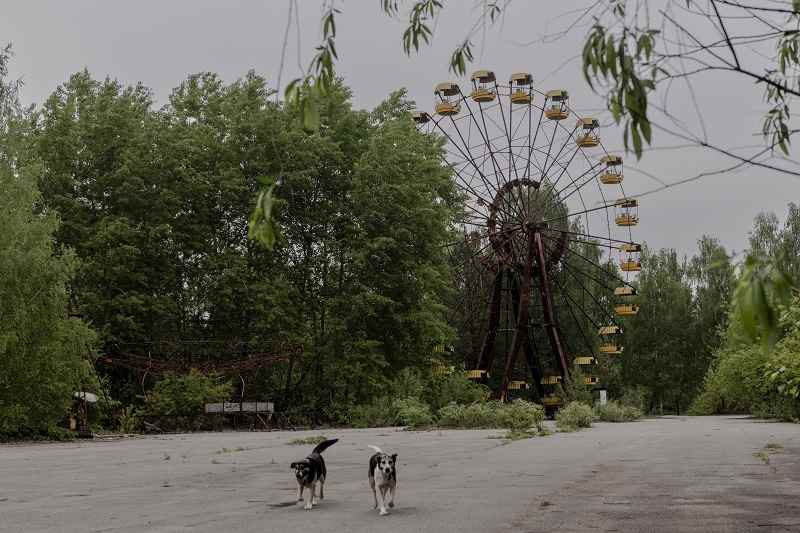
The abandoned town of Pripyat, near Chernobyl.
Even before the occupation, the station had a post-apocalyptic air. It is situated in a dense forest, swarming with mosquitoes and gnats. Pripyat, the city where employees lived before the disaster, is now being reconquered by nature.
A huge steel and concrete “sarcophagus” covers the site of the meltdown. Under its dome, 200 tons of lava-like nuclear fuel, 30 tons of highly contaminated dust and 16 tons of uranium and plutonium continue to release high levels of radiation.
In the nearby labs, sites once sterile and filled with fluorescent lights and the sound of mechanical whirring, there are now stains, burn marks and debris strewn about. Some buildings were entirely destroyed.
A few technicians have returned to work. They showed visiting reporters videos on their phones taken as they reentered their workplaces and found them in complete shambles, narrating with shock and grief each newly discovered piece of destroyed equipment.
“I’ve been working here since May 1, 1986, and everything that I was working on for 30 years was spoiled and plundered,” said Leonid Bohdan, 59, head of the lab’s spectrometry and radiochemistry department. He had interacted with Rosatom officials in the past – even traveling to Moscow in 2013 for a conference. Now he feels an intense rage toward his Russian counterparts, whom he accuses of destroying Chernobyl out of jealousy.
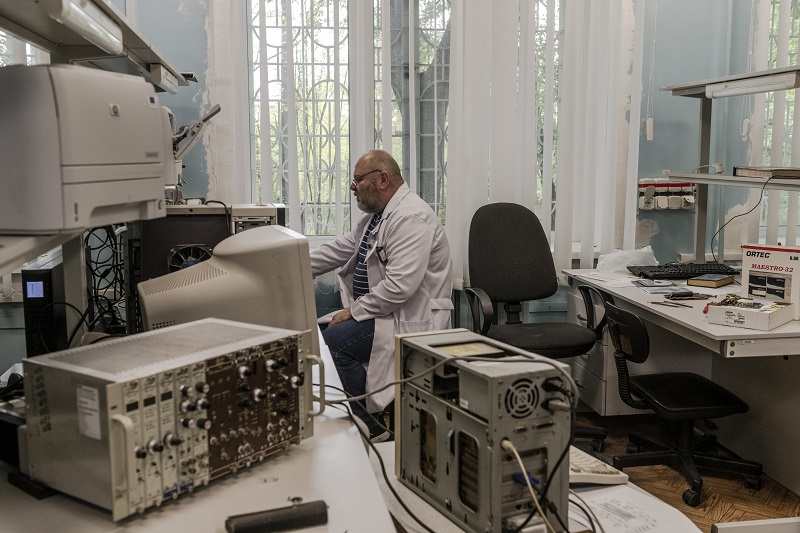
Leonid Bohdan, head of the department of spectrometry and radiochemistry at the Central Analytical Laboratory at Chernobyl.
“We will restore everything. It will all work again,” he said. “But this is as if someone came to your house, saw that everything is well and beautiful, and therefore s—s on your white bed. They are jealous that we can do something.”
Bohdan, Bespaly and Kramarenko expressed skepticism that Rosatom officials took software or equipment from Chernobyl for their own purposes. The Russians would know they couldn’t use it anyway, they said, and so the most likely explanation was that the destruction was punitive.
Another possibility, they said, was that Russian nuclear officials had begun to believe the Kremlin’s propaganda in the lead-up to the invasion, which claimed falsely that Ukraine was working with Western powers to develop a nuclear weapon. While the officials at Chernobyl found it hard to believe that their Rosatom counterparts would ignore all they knew about the Chernobyl plant – which their Soviet predecessors built – they acknowledged propaganda’s immense power, especially in wartime.
“When I saw [the propaganda], I laughed – although the situation is not funny,” said Bespaly. “My wife also works in the laboratory – we both looked at each other, there were no words.”
Over the coming months, Bespaly expects work to slowly gather steam again, though a full restoration won’t happen until martial law is lifted. For now, officials are working on better evacuation plans in case of another invasion. Russian troops have begun building up a presence again along the border near Chernobyl, and Belarusian troops have bolstered their positions, too.
The Ukrainians have decided not to refill trenches dug throughout the exclusion zone by Russian soldiers for the time being. They believe radiation emissions to be low there, and the worst damage would be to the lungs of the soldiers who inhaled radioactive dust for those weeks of occupation.
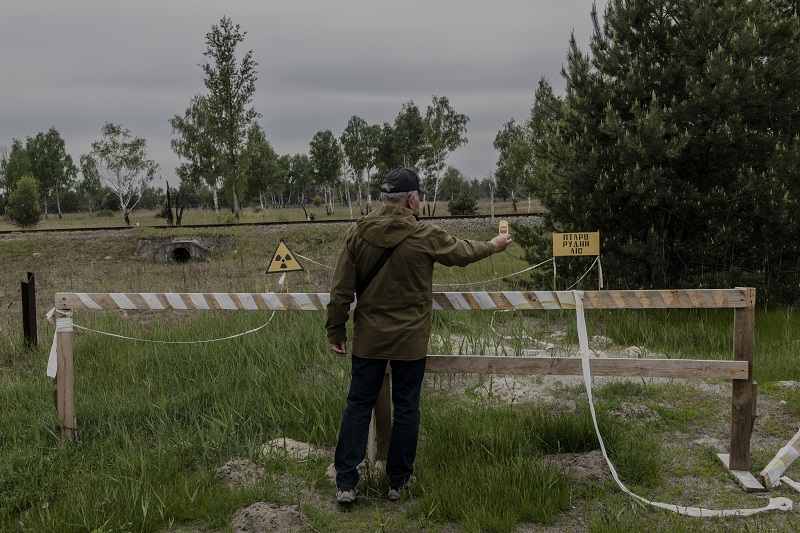
A Chernobyl employee measures radiation where Russian soldiers had dug trenches.
The real risk, Kramarenko said, is from forest fires as summer approaches. All the equipment they would have used to fight them is now gone or unusable.
“There is a danger here, and we are negotiating with donors, and appealing to the government to purchase equipment,” he said.
Perhaps the most lasting damage will be to the psyches of those employees who lived through the occupation. Their work was essential to preventing any catastrophic systems failures, and the Russians forced them to work past the point of exhaustion.
Paramedic Lyudmila Mikhailenko tended to sleep-deprived employees who were given little to eat and drink during their marathon shifts. She remembers Russian jets swooping in close overhead, and the sound of constant artillery fire as Ukrainian and Russian troops traded shells in the forests dangerously close to the plant. She said she was dealing with post-traumatic stress, and was nagged by a persistent, unanswerable question about the “madness” of the situation.
“The Russians were under orders to occupy and destroy and bomb Chernobyl,” she said. “What kind of madman issues an order to hold this place of catastrophe and tragedy hostage?”
Top Articles in News Services
-

Prudential Life Expected to Face Inspection over Fraud
-

Hong Kong Ex-Publisher Jimmy Lai’s Sentence Raises International Outcry as China Defends It
-

Japan’s Nikkei Stock Average Touches 58,000 as Yen, Jgbs Rally on Election Fallout (UPDATE 1)
-

Trump Names Former Federal Reserve Governor Warsh as the Next Fed Chair, Replacing Powell
-

Suzuki Overtakes Nissan as Japan’s Third‑Largest Automaker in 2025
JN ACCESS RANKING
-

Japan Institute to Use Domestic Commercial Optical Lattice Clock to Set Japan Standard Time
-

Israeli Ambassador to Japan Speaks about Japan’s Role in the Reconstruction of Gaza
-

Man Infected with Measles May Have Come in Contact with Many People in Tokyo, Went to Store, Restaurant Around When Symptoms Emerged
-

Prudential Life Insurance Plans to Fully Compensate for Damages Caused by Fraudulent Actions Without Waiting for Third-Party Committee Review
-

Woman with Measles Visited Hospital in Tokyo Multiple Times Before Being Diagnosed with Disease























